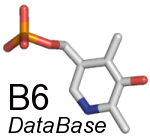|
|
| type |
Journal Article |
| authors |
Ogawa, H.; Gomi, T.; Fujioka, M. |
| title |
Serine hydroxymethyltransferase and threonine aldolase: are they identical? |
| journal |
Int J Biochem Cell Biol |
| Activity |
4.1.2.5 |
| ui |
20179370 |
| year |
(2000) |
| volume |
32 |
| number |
3 |
| pages |
289-301. |
| | |
|---|
| keywords |
Alcohol Oxidoreductases/metabolism |
| abstract |
Serine hydroxymethyltransferase, a pyridoxal phosphate-dependent enzyme, catalyses the interconversion of serine and glycine, both of which are major sources of one-carbon units necessary for the synthesis of purine, thymidylate, methionine, and so on. Threonine aldolase catalyzes the pyridoxal phosphate-dependent, reversible reaction between threonine and acetaldehyde plus glycine. No extensive studies have been carried out on threonine aldolase in animal tissues, and it has long been believed that serine hydroxymethyltransferase and threonine aldolase are the same, i.e. one entity. This is based on the finding that rabbit liver serine hydroxymethyltransferase possesses some threonine aldolase activity. Recently, however, many kinds of threonine aldolase and corresponding genes were isolated from micro- organisms, and these enzymes were shown to be distinct from serine hydroxymethyltransferase. The experiments with isolated hepatocytes and cell-free extracts from various animals revealed that threonine is degraded mainly through the pathway initiated by threonine 3- dehydrogenase, and there is little or no contribution by threonine aldolase. Thus, although serine hydroxymethyltransferase from some mammalian livers exhibits a low threonine aldolase activity, the two enzymes are distinct from each other and mammals lack the "genuine" threonine aldolase. |
| last changed |
2002/11/12 16:17 |
|











